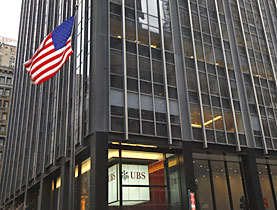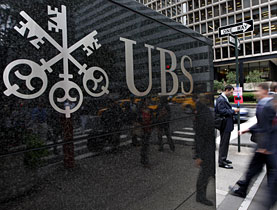Authority says UBS data handover was “correct”

Switzerland's financial services authority has defended the handover of UBS clients' documents to United States justice officials, saying it acted within the law.
The Financial Market Supervisory Authority (Finma) spokesman Alain Bichsel said the authority’s decision had been “legally correct”.
After months of pressure, UBS and Finma announced on Thursday the decision to hand over confidential details of 250 clients whom the US authorities suspect of tax evasion.
UBS also agreed to pay $780 million (SFr915.8 million) in fines after admitting “improper activities” from some of its employees.
However a temporary injunction was subsequently issued by the Swiss federal administrative court to halt the transfer of data.
The court sent a fax to this effect on Friday evening to Finma and to eight UBS clients who had appealed to the court against Finma’s decision to pass on their documents.
Serious consequences
The clients claimed that the handover of the documents would have extremely serious consequences for them. They requested the injunction on the grounds that there was insufficient legal basis for the documents to be given to the US authorities.
Their lawyer, Andreas Rüd, said: “To date, we have no idea what has been transmitted. Are they entire dossiers about each one or is it just their names?”
The court had asked Finma to give its response to the plaintiffs’ claim by Tuesday.
Finma said it had taken note of the injunction and intended to outline further its position by then.
It added that the new injunction would not change anything, as the documents had already been sent on Wednesday and the authority was not intending to release any further information.
The UBS and Finma decision has unleashed a wave of controversy in Switzerland, amid fears that it means the end of Swiss banking secrecy.
“Individual case”
In an interview with the NZZ newspaper on Saturday, Finma’s president Eugen Haltiner said the transfer of the data was an individual case and “does not mean banking secrecy per se would be lifted”.
The handover of the data, which he acknowledged was decided under intense pressure from the US Justice Department, was aimed at stabilising the Swiss financial system.
He added that the bigger civil lawsuit issued on Thursday by US tax collectors seeking the identities of about 52,000 US clients who allegedly kept billions of dollars at the bank to dodge the Internal Revenue Service would “not be very dangerous” for UBS.
Haltiner said UBS could maintain in its defence in the civil lawsuit that it had to comply with Swiss law, where tax evasion is not a criminal offence, unlike tax fraud.
“Many foreign countries cannot or do not want to understand our difference between tax fraud and tax evasion,” he told the newspaper.
“Nevertheless, the US authorities are interested in maintaining scare tactics.”
UBS has said it will fight the case. News of the case sent the UBS share price tumbling at the stock exchange, ending Friday at SFr11, down just over 14 per cent on the day.
swissinfo with agencies
In December 2007, an American billionaire property developer admitted filing a false tax return and had to pay $52 million (SFr54 million) in backdated taxes.
On May 14, 2008, former UBS employee Bradley Birkenfeld and a Liechtenstein businessman were charged by the US authorities with helping an American billionaire avoid paying taxes on $200 million of assets deposited in Swiss and Liechtenstein bank accounts.
Birkenfeld turned whistleblower, giving details of UBS private banking practices to US prosecutors. The US Department of Justice (DoJ) accused UBS of helping 20,000 US citizens evade $20 billion of taxes.
In July, a Miami court authorised the IRS to issue a summons on UBS demanding the release of confidential information on clients the agency suspected of tax evasion.
In the same month, UBS told a congressional hearing that it would stop offshore banking activities for US clients.
In November, Raoul Weil, the head of UBS’s Wealth Management International division, was indicted in the US for allegedly helping US citizens evade taxes. Weil later absconded from the US and was declared a fugitive.
In February, UBS and the Swiss authorities caved in to the DoJ to release client information. However, the IRS demand for further information remains unresolved.

In compliance with the JTI standards
More: SWI swissinfo.ch certified by the Journalism Trust Initiative










You can find an overview of ongoing debates with our journalists here . Please join us!
If you want to start a conversation about a topic raised in this article or want to report factual errors, email us at english@swissinfo.ch.